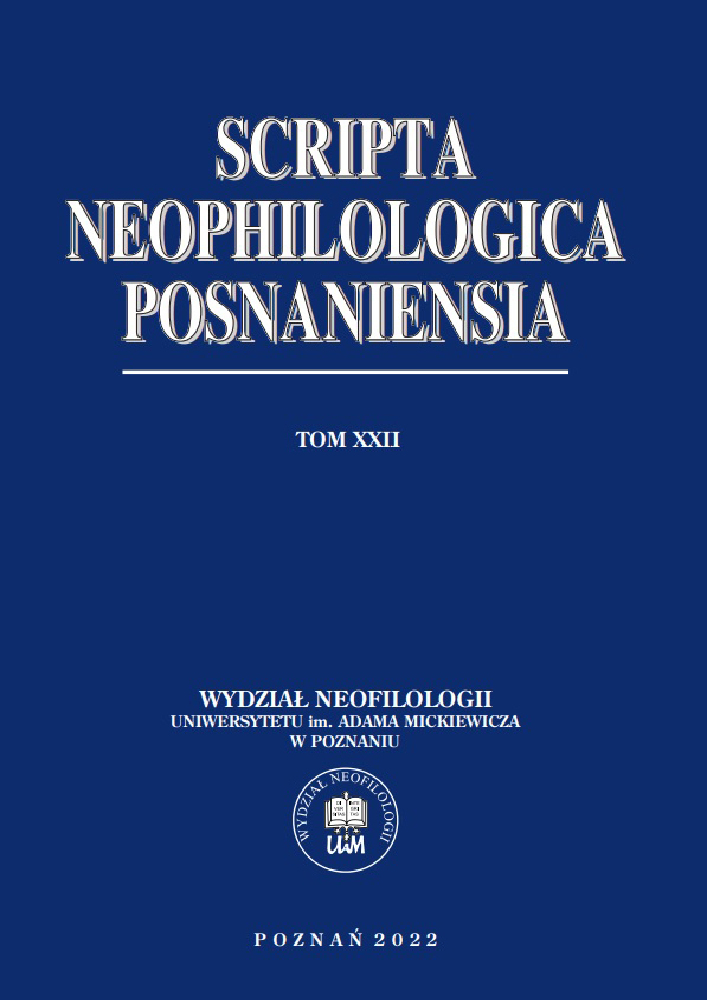Abstrakt
Pandemic Covid-19 was the time which undermined the existing systems of work and communication in all fields including education. Firstly the model of linguistic-communicative competence was defined in ecolinguistic perspective. Secondly the author aimed to verify if development of student’s linguistic-communicative competence in school ecosystem was shattered in pandemic environment and if it did so in what way. It was assumed that a teacher in order to shape student’s resources of skills, knowledge and motivation uses verbal and non-verbal managing strategies at certain levels: managing strategies of knowledge, managing strategies of interaction resources and managing strategies of class infrastructure.
Bibliografia
Bashir, M.F., Benjiang M., Bilal, M., Bushra, K., Bashir, M.A., Duojiao, T. i M. Bashir 2020.
“Correlation between Climate Indicators and COVID-19 Pandemic in New York, USA”. Science of the Total Environment. Baylon, Ch. i X. Mignot. 2008. Komunikacja. Kraków: Wydawnictwo FLAIR.
DeVito, J. A. 1998. The interpersonal communication book. New York: Longman.
Grice, P.G. 1975. “Logic and conversation”. W: Cole, P. i J.L. Morgan (red.). Speech acts. New York: Academic Press. 41-58. https://doi.org/10.1163/9789004368811_003 DOI: https://doi.org/10.1163/9789004368811_003
Hodges, C., Moore, S., Lockee, B., Trust, T. i A. Bond. 2020. “The difference between emergency remote teaching and online learning”. Educause Review 27. 1–12.
Morreale, S.P, Spitzberg, B.H. i J.K. Barge. 2007. Komunikacja między ludźmi. Motywacja, wiedza i umiejętności. Warszawa: Wydawnictwo Naukowe PWN.
Noskova, T. i O. Yakovleva. 2015. “Educational interactions quality in e-learning environment“. W zbiorze: Mkrttchian, V., Bershadsky, A., Bozhday, A., Kataev, M., i S. Kataev. Handbook of Research on Estimation and Control Techniques in E-Learning Systems. Hershey, PA: IGI Global.
Oliver, M. 2000. “Evaluating online teaching and learning”. Information Services and Use 20. 2–3. 83–94. https://doi.org/10.3233/ISU-2000-202-304 DOI: https://doi.org/10.3233/ISU-2000-202-304
Ouyang, F. i C. Scharber. 2018. “Adapting the TPACK framework for online teaching within higher education”. International Journal of Online Pedagogy and Course Design 8.1. 42–59. https://doi.org/10.4018/IJOPCD.2018010104 DOI: https://doi.org/10.4018/IJOPCD.2018010104
Puppel, S. 2004. “An outline of a domain-resource-agent-access-management (DRAAM) model of human communication: towards an ecology of human communication”. Electronic journal Oikeios Logos 1.
Puppel, S. i J. Puppel. 2005. „Zagadnienie percepcji języka naturalnego w triadzie: język ojczysty – język globalny – język sąsiedni na przykładzie triady: język polski – język angielski – język niemiecki w ujęciu ekolingwistycznym: próba typologii”. Scripta Neophilologica Posnaniensia VII. 55-95.
Sahlberg, P. 2020. “Does the pandemic help us make education more equitable?“. Educational Research for Policy Prac and Practice 20. 11–18. https://doi.org/10.1007/s10671-020-09284-4 DOI: https://doi.org/10.1007/s10671-020-09284-4
Scrivener, J. 2005. Learning teaching. The essential guide to English language teaching. Gosport: Macmillan.
Sikorski, W. 2007. Gesty zamiast słów. Psychologia i trening komunikacji niewerbalnej. Kraków: Ofi cyna Wydawnicza Impuls.
Spitzberg, B.H. i W.R. Cupach. 1984. Interpersonal communication and competence. Beverly Hills, CA: Sage Publications.
Steward, J. 2005. Mosty zamiast murów. Warszawa: Wydawnictwo Naukowe PWN.
Storey, J. 1992. Developments in the management of human resources: an analytical review. Oxford: Blackwell.
Sztejnberg, A. 2006. Komunikacyjne środowisko nauczania i uczenia się. Wrocław: Wydawnictwo Astrum.
Wester, E.R., Walsh, L.L., Arango-Caro, S. i K.L. Callis-Duehl. 2021. “Student Engagement Declines in STEM Undergraduates during COVID-19–Driven Remote Learning”. Journal of Microbiology and Biology Education 22.1. ev22i21. https://doi.org/10.1128/jmbe.v22i1.2385 DOI: https://doi.org/10.1128/jmbe.v22i1.2385
Wiertlewska, J. 2011. „Translingwalne nauczanie języka angielskiego w triadzie: język angielski – język globalizujący – inny język obcy: podejście ekolingwistyczne.” W zbiorze: Puppel, S. (red.) Transkomunikacja. W stronę sprofi lowania przestrzeni publicznej jako wielopłaszczyznowej przestrzeni komunikacyjnej. Scripta de Communicatione Posnaniensi. Seria: Prace Naukowe Katedry Ekokomunikacji UAM. Poznań: Zakład Grafi czny UAM. 145–158.
UNESCO: 290 Million Students Stay Home due to Coronavirus. (2020, March 7).
https://stemeducationjournal.springeropen.com/articles/10.1186/s40594-022-00335-1
Licencja

Utwór dostępny jest na licencji Creative Commons Uznanie autorstwa – Bez utworów zależnych 4.0 Międzynarodowe.
